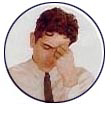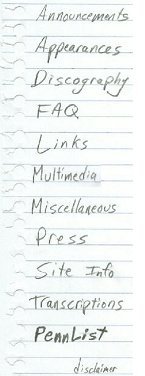


New, retrospective album due out 4/17/2007
This retrospective contains 20 tracks including 8 previously unreleased tracks. According to Spencer at the Pennlist, "The new versions are significantly different from the originals - Lucky One loses the Ronnie Spector treatment, Bunker Hill and Cupid are entirely reimagined - and one of my favorite songs, Try, sounds similar, but a bit more rocking and raw than the original. The rest of the CD, especially March era recordings, sound better and more vibrant after getting the re-mastering treatment."
3/9/07 Update: More information about this album from Michael's label can be found in this PDF.
Tracklist:
- Lucky One (Version One) (Previously Unreleased)
- Bunker Hill (New Version) (Previously Unreleased)
- Out Of My Hands
- Cupid's Got A Brand New Gun (New Version) (Previously Unreleased)
- Coal
- Try (Alt. Vers.) (Previously Unreleased)
- No Myth
- Barely A Sound (Instrumental) (Previously Unreleased)
- Don't Let Me Go
- All That That Implies
- Whole Truth
- Brave New World
- Me Around (Demo) (Previously Unreleased)
- Long Way Down (Look What The Cat Drug In) (New Version) (Previously Unreleased)
- Macy Day Parade
- Figment
- Bucket Brigade
- I Can Tell
- Walter Reed
- Opening (From The Film, Melvin Goes To Dinner) (Previously Unreleased)
Official liner notes:
Looking over Michael Penn's four-album tenure at BMG and Sony – March (1989), Free For All (1992), Resigned (1997) and MP4: Days Since a Lost Time Accident -- is sort of like watching that modern-day, time-shuffling film noir Memento, a comparison that the cinema-savvy Penn might appreciate. His is a career story that unfolds in reverse when compared to many of his contemporary singer-songwriters. The Los Angeles-based Penn debuted dramatically in 1989 with "No Myth", an instantly memorable anthem to youthful romantic longing that became a major MTV and radio hit, and March, an album hailed by critics and embraced by a wide-ranging audience. But the mainstream soon moved on and Penn segued from almost-household name into highly regarded but far less visible cult status, an artist whose carefully crafted albums grew more incisive as his market share became more rarefied.
Penn can perhaps also be likened to one of the authors he has often expressed admiration for, novelist and screenwriter John Fante, who lived in the Bunker Hill neighborhood that Penn name-checks on one of these tracks. Fante amassed a rich body of work evoking mid-20th Century L.A., work that continues to be unearthed and appreciated by new audiences, work with enduring relevance. For a time, Fante was a part of the Hollywood movie machine, toiling in it while not quite feeling part of it. Similarly, Penn is an independent thinker functioning in a major-label world, and that shows in Penn's approach to this collection.
Palms and Runes, Tarot and Tea contains material garnered from throughout Penn's sixteen-year career – album cuts, demos and alternate takes, along with a few freshly recorded versions of older tunes – but it has the feel of something entirely new. When Legacy approached Penn to help assemble this compilation in a very hands-on way, he saw an opportunity: "I figured I should try to make this an actual album instead of just a collection of old songs-- or at least make it feel like one to me. I picked stuff that I still felt connected to and that fit together."
By juxtaposing tracks according to mood and content rather than just by chronology or familiarity, Penn has fashioned a compelling, impressionistic self-portrait: "I wanted it to head somewhere. I still think of albums as having sides so it had to be split in two.. but since most of what I write about is the difference between love and limerence, it wasn't hard to fashion a through-line in my head."
"Limerence" isn't the kind of word one runs across every day, and rarely in conversation, but Penn has chosen it pointedly. As the Oxford American Dictionary defines it, limerence is "the state of being infatuated or obsessed with another person, typically involuntary and characterized by a strong desire for reciprocation of one's feelings..." – encapsulating in a single word the dilemma so often faced by the protagonists of Penn's songs, characters "wounded unto death by something called love," as he puts it in "Cupid's Got A Brand New Gun."
In fact, Penn went into the studio to remake "Cupid's Got a Brand New Gun" and two others: "I always felt that 'Cupid' was a better song than the original recording. 'Bunker Hill' and 'Long Way Down' are always in my live set and I still feel very connected to them so recording them again was fun."
Penn's songwriting scenarios -- of relationships corroded by lies, delusion and betrayal -- incorporate both serious drama and black humor. They might seem bitter or cynical, except that in many of his songs hope, however tenuous, springs eternal. Penn writes durable melodies, often with a bright, jangly, mid-sixties folk-rock feel that belies the downbeat nature of his words. There's just a hint of the psychedelic, to make everything seem a little bit woozy. His lyrics, which boast impressively fast-paced verbal twists and turns, balance the specific with the surreal. And he brings an affecting, melancholy ache to his vocal performances, especially when he's playing the little guy with big ideas battling circumstances beyond his control. His independently released 2005 album Mr. Hollywood, Jr. 1947, from which "Walter Reed" was taken, particularly focuses on this theme, moving away from romantic miniatures of contemporary life to conspiratorial stories in a post-World War II military-industrial complex, his guitar-based arrangements underscored by eerie electronic touches. An engrossing song cycle, redolent of Fante that deserved a wider hearing, Mr. Hollywood Jr. 1947 has now been rescued and reissued as part of Penn's SonyBMG catalogue.
Among other previously unreleased tracks, "Try," he explains, "was just an alternate version we recorded while in New York for some Sony wing ding. The version of 'Lucky One' here is the one I originally recorded for Days Since A Lost Time Accident. That song started out as this little acoustic lullaby to my son but my manager at the time heard it and thought it could get on the radio... that's where all the trouble always begins. Giving him the benefit of the doubt, I recorded it for the album, goosed up to this quirky rock version. Brendan took it and made it huge and amazing. I figured a fan might want to have this too."
One can search for – and find – themes repeated or contrasted in Penn's artful stacking of these tracks. On one, a character is stuck in traffic on L.A.'s winding Cahuenga Boulevard ; on another, he's racing down a freeway towards the future. The big beat of "No Myth" is placed beside the elegant, evocative "Barely A Sound," which has neither words nor super-sized drums yet still manages to be utterly affecting.
No exercise in nostalgia, Palms and Runes is an invitation from Penn to take a deeper look at his repertoire, to discover or get reacquainted, to find connections and dig for clues. This is Michael Penn in the here and now, the place where he's always managed to stay. Don't look back.
-- Michael Hill
1/27/07
| Press | Site Info | Transcriptions | Main Menu |